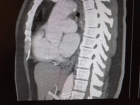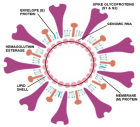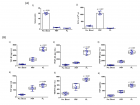Abstract
Research Article
Control of rice bakanae disease by seed dressing with mixed solution of fludioxonil, metalaxyl-M and azoxystrobin
Deng Chen, Qi-Juan Hu and Xiao-Feng Chen*
Published: 06 January, 2023 | Volume 7 - Issue 1 | Pages: 001-007
Rice bakanae disease is a typical seed-borne disease caused by Fusarium fujikuroi that occurs in seedling beds and in fields. Fungicide seed treatment is an effective solution to this disease. In this study, we used a triple-fungicide suspension identified as 11% FMA, which is composed of 1.1% fludioxonil, 3.3% metalaxyl-M and 6.6% azoxystrobin to coat rice seeds for the prevention of bakanae disease. 11% FMA is water-logging resistant for rice seed treatment. Results showed that the mycelial growth of F. fujikuroi was significantly inhibited by 11% FMA in the laboratory test. Seed dressing with FMA at the rate of 1, 2, and 4 g per kg of seeds promoted seed germination and growth of seedling roots. Treatment with 11% FMA under all dose rates prevented rice bakanae disease of seedlings by more than 90%, especially by more than 95% at 4, 6 and 8 g per kg of seeds. During the subsequent maturation period, rice bakanae control efficiency reaches above 95% as well at 6 or 8 g per kg of seeds, slightly larger than about 92% at 1 or 2 g per kg of seeds. Above all, the rice yield notably improved by 11% with 1 g/kg, by around 8% with 2, 4, or 8 g/kg and by 5% with 6 g/kg treatment.
Read Full Article HTML DOI: 10.29328/journal.jpsp.1001096 Cite this Article Read Full Article PDF
Keywords:
Rice bakanae disease; Fludioxonil; Metalaxyl-M; Azoxystrobin; Seed dressing; Fusarium fujikuroi
References
- Hsieh WH, Smith SN, Snyder WC. Mating groups in Fusarium moniliforme. Phytopathol. 1977; 67:1041-1043.
- Ou SH. Rice Diseases. Second edition. Slough, UK: CAB International. 1987.
- Singh R, Sunder S. Footrot and bakanae of rice: retrospects and prospects. Int. J. Trop. Plant Disease. 1997; 15:153-176.
- Mew TW, Gonzales P. Seed-borne fungi causing stem, leaf sheath, and root diseases in rice. In: A handbook of rice seed-borne fungi, eds. by TW Mew and P Gonzales. 2002; 31–34. Science Publishers, Enfield, NH, USA. International Rice Research Institute, Makati, Philippines.
- Wulff EG, Sørensen JL, Lübeck M, Nielsen KF, Thrane U, Torp J. Fusarium spp. associated with rice Bakanae: ecology, genetic diversity, pathogenicity and toxigenicity. Environ Microbiol. 2010 Mar;12(3):649-57. doi: 10.1111/j.1462-2920.2009.02105.x. Epub 2009 Nov 25. PMID: 20002135.
- Hsuan HM, Salleh B, Zakaria L. Molecular identification of Fusarium species in Gibberella fujikuroi species complex from rice, sugarcane and maize from Peninsular Malaysia. Int J Mol Sci. 2011;12(10):6722-32. doi: 10.3390/ijms12106722. Epub 2011 Oct 11. PMID: 22072914; PMCID: PMC3211005.
- Matic S, Gullino ML, Spadaro D. The puzzle of bakanae disease through interactions between Fusarium fujikuroi and rice. Front Biosci (Elite Ed). 2017 Jun 1;9(2):333-344. doi: 10.2741/e806. PMID: 28410155.
- Ito S, Kimura J. Studies on the bakanae disease of the rice plant. Rep. Hokkaido Natl. Agric. Exp. Stat. 1931; 27:1-95.
- Amoah BK, Rezanoor HN, Nicholson P, MacDonald MV. Variation in the Fusarium section Liseola: pathogenicity and genetic studies of Fusarium moniliforme Sheldon from different hosts in Ghana. Plant Pathol. 1995; 44:563-572.
- Ogawa K. Damage by bakanae disease and its chemical control. Jpn. Pestic. Info. 1988; 52:13-15.
- Cao DD, Ruan XL, Zhan Y, Xu JF. Control Efficiency of Different Treatments on Rice Bakanae Disease. Plant Diseases and Pests. 2015; 6:31-34.
- Chen Z, Gao T, Liang S, Liu K, Zhou M, Chen C. Molecular mechanism of resistance of Fusarium fujikuroi to benzimidazole fungicides. FEMS Microbiol Lett. 2014 Aug;357(1):77-84. doi: 10.1111/1574-6968.12504. Epub 2014 Jul 7. PMID: 24913566.
- Li M, Li T, Duan Y, Yang Y, Wu J, Zhao D, Xiao X, Pan X, Chen W, Wang J, Chen C, Zhou M. Evaluation of Phenamacril and Ipconazole for Control of Rice Bakanae Disease Caused by Fusarium fujikuroi. Plant Dis. 2018 Jul;102(7):1234-1239. doi: 10.1094/PDIS-10-17-1521-RE. Epub 2018 Apr 25. PMID: 30673573.
- Park WS, Choi HW, Han SS, Shin D, Shim HK, Jung ES, Lee SW, Lim CK, Lee YH. Control of bakanae disease of rice by seed soaking into the mixed solution of prochloraz and fludioxonil. Res. Plant Dis. 2009; 15:94-100.
- Kim SH, Park MR, Kim YC, Lee SW, Choi BR, Lee SW, Kim IS. Degradation of prochloraz by rice bakanae disease pathogen Fusarium fujikuroi with differing sensitivity: a possible explanation for resistance mechanism. J. Korean Soc. Appl. Biol. Chem. 2010; 53:433-439.
- Qu XP, Li JS, Wang JX, Wu LY, Wang YF, Chen CJ, Zhou MG, Hou YP. Effects of the dinitroaniline fungicide fluazinam on Fusarium fujikuroi and rice. Pestic Biochem Physiol. 2018 Nov;152:98-105. doi: 10.1016/j.pestbp.2018.09.010. Epub 2018 Sep 20. PMID: 30497718.
- Tateishi H, Saishoji T, Suzuki T, Chida T. Antifungal properties of the seed disinfectant miconazole and its protection against “bakanae” and other diseases of rice. Jpn. J. Phytopathol. 1998; 64:443-450.
- Hou YP, Qu XP, Mao XW, Kuang J, Duan YB, Song XS, Wang JX, Chen CJ, Zhou MG. Resistance mechanism of Fusarium fujikuroi to phenamacril in the field. Pest Manag Sci. 2018 Mar;74(3):607-616. doi: 10.1002/ps.4742. Epub 2017 Nov 27. PMID: 28960890.
- Fungicide Resistance Action Committee. Crop Life Intl. Brussels, Belgium. https://www.frac.info. 2020.
- He Y, Jiao X, Zhang T, Wang M, Khan M, Khan MR, She Y. Study on the dissipation pattern and risk assessment of metalaxyl-M in rice grains and paddy soil and water by liquid chromatography-tandem mass spectrometry. Environ Sci Pollut Res Int. 2021 Jan;28(4):4245-4252. doi: 10.1007/s11356-020-10802-3. Epub 2020 Sep 16. PMID: 32939654.
- Jimenez JJ, Bernal JL, del Nozal MJ, Bernal J, Toribio L. Persistence and degradation of metalaxyl, lindane, fenvalerate and deltamethrin during the wine making process. Food Chem. 2007; 104:216-223.
- Karras G, Savvas D, Patakioutas G, Pomonis T, Albanis T, Pomonis P. Modelling the transport of metalaxyl in gerbera plants grown in a closed-loop hydroponic system. Biosyst. Eng. 2007; 96:279-292.
- Monkiedje A, Spiteller M, Maniepi SJN, Sukul P. Influence of metalaxyl- and mefenoxam-based fungicides on chemical and biochemical attributes of soil quality under field conditions in a southern humid forest zone of Cameroon. Soil Biol. Biochem. 2007; 39:836-842.
- Liang S., Xu X., Lu Z., 2018. Effect of azoxystrobin fungicide on the physiological and biochemical indices and ginsenoside contents of ginseng leaves. J. Ginseng Res. 42, 175-182.
- Hossain MT, Khan A, Chung EJ, Rashid MH, Chung YR. Biological Control of Rice Bakanae by an Endophytic Bacillus oryzicola YC7007. Plant Pathol J. 2016 Jun;32(3):228-41. doi: 10.5423/PPJ.OA.10.2015.0218. Epub 2016 Jun 1. PMID: 27298598; PMCID: PMC4892819.
- Sauter H, Steglich W, Anke T. Strobilurins: Evolution of a New Class of Active Substances. Angew Chem Int Ed Engl. 1999 May 17;38(10):1328-1349. doi: 10.1002/(SICI)1521-3773(19990517)38:10<1328::AID-ANIE1328>3.0.CO;2-1. PMID: 29711574.
- Gisi U. Synergistic interaction of fungicides in mixtures. Phytopathol. 1996; 86:1273-1279.
- Abdel-Ghani AH, Sanchez DL, Kumar B, Lubberstedt T. Paper Roll Culture and Assessment of Maize Root Parameters. Bio-protoc. 2016; 6:e1926. DOI: 10.21769/BioProtoc.1926.
- Amatulli MT, Spadaro D, Gullino ML, Garibaldi A. Molecular identification of Fusarium associated with bakanae disease of rice in Italy and assessment of their pathogenicity. Plant Pathol. 2010; 59:839-844.
- Amatulli MT, Spadaro D, Gullino ML, Garibaldi A. Conventional and real-time PCR for the identification of Fusarium fujikuroi and Fusarium proliferatum from diseased rice tissues and seeds. Eur. J. Plant Pathol. 2012; 134:401-408.
Figures:
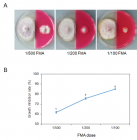
Figure 1
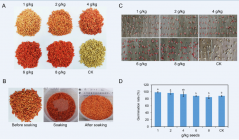
Figure 2
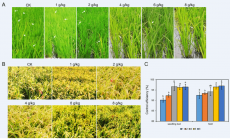
Figure 3
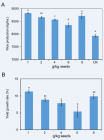
Figure 4
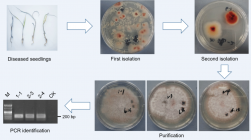
Figure 5
Similar Articles
-
In vitro and preventative field evaluations of potential biological control agents and synthetic fungicides for control of Clarireedia jacksonii sp. nov.Robert A Kerr*,Jeffery W Marvin,Lambert B McCarty,William C Bridges,S Bruce Martin,Christina E Wells. In vitro and preventative field evaluations of potential biological control agents and synthetic fungicides for control of Clarireedia jacksonii sp. nov.. . 2020 doi: 10.29328/journal.jpsp.1001043; 4: 001-008
-
Strobilurins: New group of fungicidesRasha E Selim*,Mohamed S Khalil. Strobilurins: New group of fungicides. . 2021 doi: 10.29328/journal.jpsp.1001062; 5: 63-064
-
Control of rice bakanae disease by seed dressing with mixed solution of fludioxonil, metalaxyl-M and azoxystrobinDeng Chen,Qi-Juan Hu,Xiao-Feng Chen*. Control of rice bakanae disease by seed dressing with mixed solution of fludioxonil, metalaxyl-M and azoxystrobin. . 2023 doi: 10.29328/journal.jpsp.1001096; 7: 001-007
Recently Viewed
-
Hypochlorous acid has emerged as a potential alternative to conventional antibiotics due to its broad-spectrum antimicrobial activityMaher M Akl*. Hypochlorous acid has emerged as a potential alternative to conventional antibiotics due to its broad-spectrum antimicrobial activity. Int J Clin Microbiol Biochem Technol. 2023: doi: 10.29328/journal.ijcmbt.1001026; 6: 001-004
-
KYAMOS Software - Mini Review on the Computer-Aided Engineering IndustryAntonis Papadakis*,Sofia Nikolaidou. KYAMOS Software - Mini Review on the Computer-Aided Engineering Industry. Int J Phys Res Appl. 2025: doi: 10.29328/journal.ijpra.1001105; 8: 010-012
-
Ischemic Stroke and Myocarditis Revealing Behçet’s Disease in a Young Adult: Diagnostic Challenges and Therapeutic PerspectivesObeidat Saleh Muhammed*,Abdallani B,Amine Z,Boucetta A,Bouziane M,Haboub M,Habbal R. Ischemic Stroke and Myocarditis Revealing Behçet’s Disease in a Young Adult: Diagnostic Challenges and Therapeutic Perspectives. J Cardiol Cardiovasc Med. 2025: doi: 10.29328/journal.jccm.1001205; 10: 016-021
-
Evolution of the Mineralocorticoid Receptor and Gender Difference in Cardiovascular PathologyAlessandro Zuccalà*. Evolution of the Mineralocorticoid Receptor and Gender Difference in Cardiovascular Pathology. J Cardiol Cardiovasc Med. 2025: doi: 10.29328/journal.jccm.1001204; 10: 008-015
-
Texture of Thin Films of Aluminum Nitride Produced by Magnetron SputteringStrunin Vladimir Ivanovich,Baranova Larisa Vasilievna*,Baisova Bibigul Tulegenovna. Texture of Thin Films of Aluminum Nitride Produced by Magnetron Sputtering. Int J Phys Res Appl. 2025: doi: 10.29328/journal.ijpra.1001106; 8: 013-016
Most Viewed
-
Evaluation of Biostimulants Based on Recovered Protein Hydrolysates from Animal By-products as Plant Growth EnhancersH Pérez-Aguilar*, M Lacruz-Asaro, F Arán-Ais. Evaluation of Biostimulants Based on Recovered Protein Hydrolysates from Animal By-products as Plant Growth Enhancers. J Plant Sci Phytopathol. 2023 doi: 10.29328/journal.jpsp.1001104; 7: 042-047
-
Sinonasal Myxoma Extending into the Orbit in a 4-Year Old: A Case PresentationJulian A Purrinos*, Ramzi Younis. Sinonasal Myxoma Extending into the Orbit in a 4-Year Old: A Case Presentation. Arch Case Rep. 2024 doi: 10.29328/journal.acr.1001099; 8: 075-077
-
Feasibility study of magnetic sensing for detecting single-neuron action potentialsDenis Tonini,Kai Wu,Renata Saha,Jian-Ping Wang*. Feasibility study of magnetic sensing for detecting single-neuron action potentials. Ann Biomed Sci Eng. 2022 doi: 10.29328/journal.abse.1001018; 6: 019-029
-
Pediatric Dysgerminoma: Unveiling a Rare Ovarian TumorFaten Limaiem*, Khalil Saffar, Ahmed Halouani. Pediatric Dysgerminoma: Unveiling a Rare Ovarian Tumor. Arch Case Rep. 2024 doi: 10.29328/journal.acr.1001087; 8: 010-013
-
Physical activity can change the physiological and psychological circumstances during COVID-19 pandemic: A narrative reviewKhashayar Maroufi*. Physical activity can change the physiological and psychological circumstances during COVID-19 pandemic: A narrative review. J Sports Med Ther. 2021 doi: 10.29328/journal.jsmt.1001051; 6: 001-007

HSPI: We're glad you're here. Please click "create a new Query" if you are a new visitor to our website and need further information from us.
If you are already a member of our network and need to keep track of any developments regarding a question you have already submitted, click "take me to my Query."






